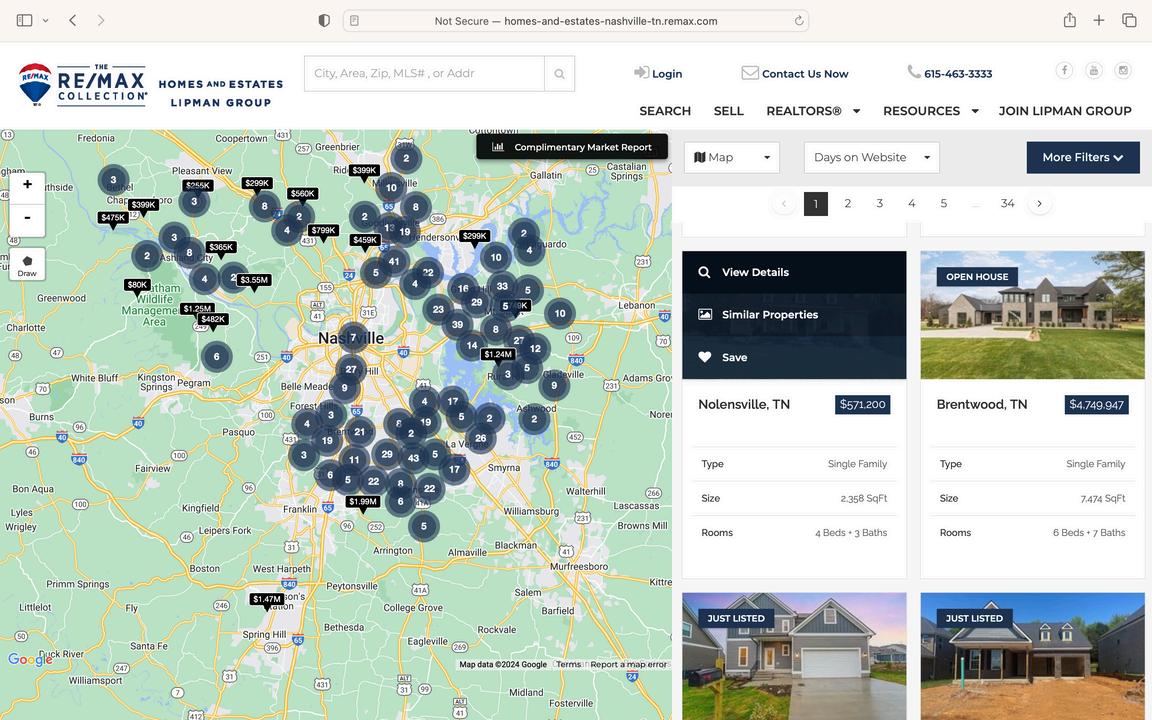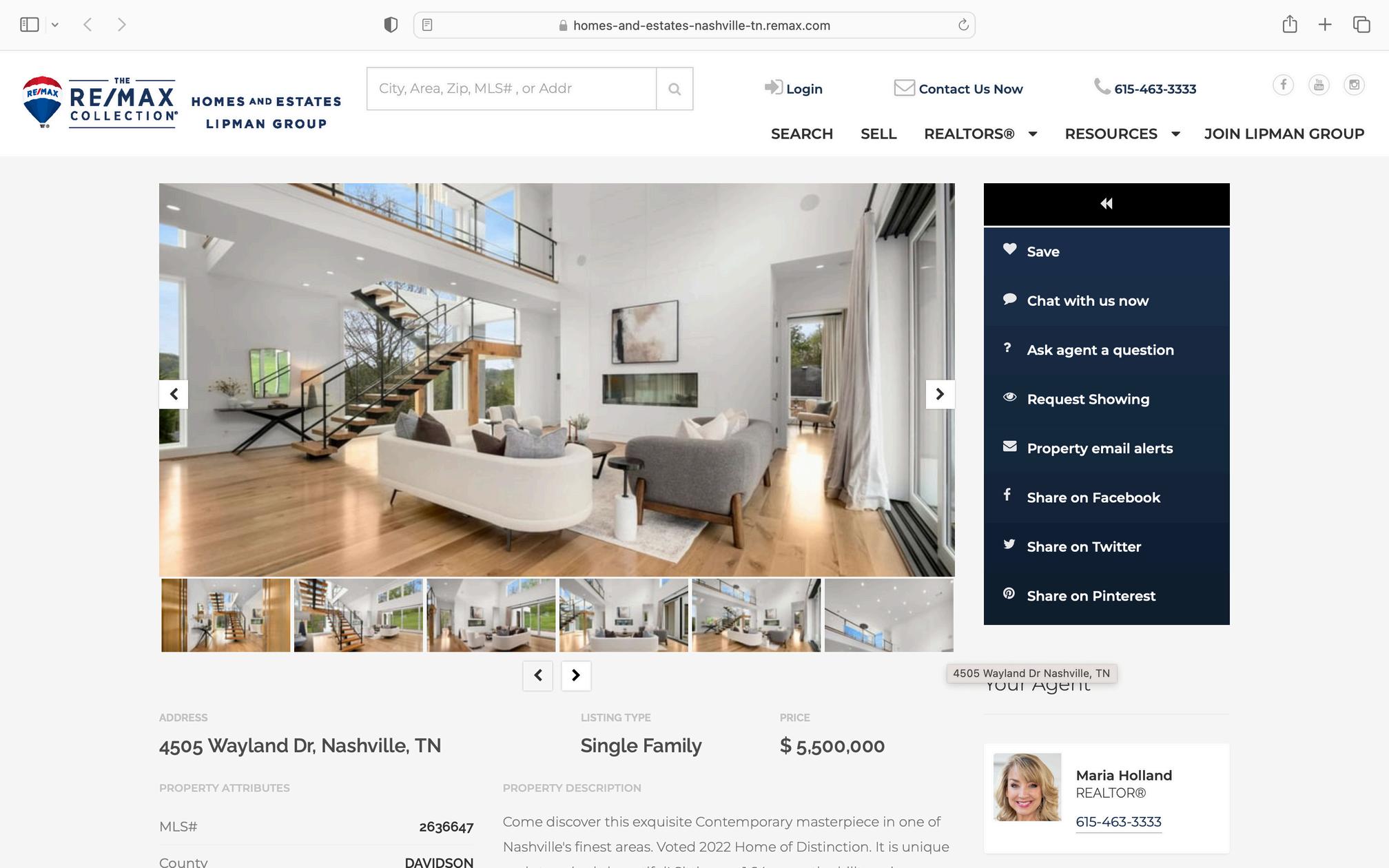

buyer’sguide


PURCHASE WITH CONFIDENCE FROM START TO SOLD


meet sutton
Sutton Lipman Costanza is a native Nashvillian as well as a second-generation, multi-million-dollar REALTOR® Sutton graduated with a Bachelor of Arts degree from The George Washington University Before jumping into her family's real estate business, she felt called to work at Centerstone, a community-based behavioral health care organization in Nashville. Sutton's time at Centerstone gave her a broad sense of human relationship interactions and an intuitiveness that helps others see the best in themselves
In 2009, she began her real estate career and hasn't looked back. Sutton is proud to be a part of the business her father created in Nashville in 1989 Whether her clients are looking to settle in suburban growing communities or become part of the urban excitement of living in a downtown condominium, Sutton knows where the inventory can be found She is known for her genuine compassion and cares deeply about assisting in meeting the needs and wants of her clients. She strives to ensure a seamless and successful transaction, and most importantly, she enjoys building lasting relationships with her clients through dedication and follow-through
In her free time, Sutton enjoys spending time with her family (which includes two adorable young boys), attending her children's baseball games, exploring the ever-growing Nashville restaurant scene with her husband and friends, cozying up with a good book, traveling, knitting and playing tennis
Make time to connect with a longstanding, trusted professional in Middle Tennessee and learn about our city and its exciting, emerging real estate opportunities Sutton can help you live the life you envision!




"We have worked with Sutton Lipman Costanza in buying two homes as well as the sale of our first home, and I cannot recommend her enough as a REALTOR® She is the ultimate professional, making sure that your every want and need is taken care of. Both times we bought, she found the house/got us in to see it before it was actually listed (because of the aggressive nature of the East Nashville market!) She also had to go to bat for us on a few issues, and her diplomatic negotiating got us exactly what we wanted in each case”


"I really can't say enough about Sutton When I moved to Nashville, I wanted to find a REALTOR® who had grown up here (The market is so low on inventory that it's hard to buy here without an inside edge) Sutton grew up in real estate (her father is a REALTOR®) and knows everything you would want to know about the Nashville market - and buying and selling here"
"Sutton was wonderful to work with! This was our first home purchase, and she guided us through the process perfectly She took her time and worked around the clock We will be repeat customers going forward! Sutton, thank you again, and thank you so much for helping Katie and me!"


the road home
You’ve heard it before: buying a home may be the largest purchase you will ever make Does that make you nervous? Consider this: it can also be one of the best investments you will ever make
From the pride you feel by being a homeowner to the potential tax deductions associated with home ownership, the benefits are plenty If you’re ready to travel the road toward home ownership, take your first step with the RE/MAX® Homebuyer’s Guide This guide is a resource to help familiarize you with the home buying process and present you with relevant information, including a list of terms, things to consider when choosing a home, and a checklist to help you make the right decisions for you.
benefits of homeownership
As a homeowner, you have the right to paint the bathroom or change the flooring without asking permission
Rent may rise over time, while mortgage payments stay consistent throughout the duration of a fixedrate mortgage loan
Month by month, you pay down the mortgage and increase your equity
Calculate your profit by subtracting what you still owe on your mortgage from the current value of the home
Over a lifetime, home ownership builds wealth.
Example: $475,000 - $375,000 = $100,000
An increase in your property value equals an increase in your overall net worth
You can now put down roots in your new neighborhood! Add a personal touch to your home, get involved in the community, and enjoy the American dream!
As a homeowner, you may be able to deduct your mortgage interest, property tax payments, and closing fees from your federal taxable income
This is a hefty deduction for many people because interest payments are often the largest part of a mortgage payment in the early years of owning a home
selecting the right agent

In a 2023 survey conducted by the National Association of REALTORS®, 98% of all homebuyers considered honesty/integrity to be the most important quality when hiring a real estate professional. The second and third most valued qualities included responsiveness and knowledge of the purchase process.
Whether you are moving across town or across the country, the real estate market is a big place. An experienced RE/MAX Homes and Estates agent can help you navigate it while operating with your three most critical qualities in a REALTOR®... integrity, responsiveness, and expertise. RE/MAX agents have access to the most current market information and can help you make informed decisions about the areas and properties that interest you As you move through the process, your RE/MAX agent can walk you through confusing paperwork and, of course, assist you in house hunting
TIPS
Do your due diligence.
Research real estate agents online, read reviews, and solicit recommendations from family and friends.
Choose someone you trust.
A home is a very personal, expensive purchase. It’s critical that your real estate agent makes you feel comfortable, listens to you and respects your views
Look for experience.
An experienced, full-time real estate professional will likely have already experienced market ups and downs, and will know how to navigate current conditions.
Communication matters.
You’re going to have questions during this process it’s natural That’s why it’s important you choose an agent who you feel has your best interests in mind and will help you navigate the process with effective and timely communication
Ask these questions.
1 How much experience do you have, and can you provide references?
2 What services and resources do you offer?
3 How will the homebuying process work, and what’s expected of me?
4 How much time can you devote to my needs, and how often will you communicate with me?
5 What types of homes are your specialty, and are you familiar with the neighborhoods that interest me?
6 How many homes have you helped customers buy in the last year?
7 What happens after we make an offer? What about after closing?


Almost 90% of home buyers utilize an agent to purchase their home For over 50 years, RE/MAX has been building a global network of highly productive real estate professionals RE/MAX agents average more sales and have more real estate sales experience than other real estate agents This means when you work with a RE/MAX agent, you are getting a dedicated real estate professional with access to a vast knowledge base, as well as the tools and support needed to help you find and purchase the right home for you.
Vision
Passionately helping all live the life they envision.
Mission
To operate with originality, authenticity, and integrity while continuing to utilize our years of experience in operations, sales, agent development, and marketing.
Core Vallues
Integrity, Expertise, Culture, Differentiation, Reputation, and Excellence
To strive to be honorable and to abide by the Golden Rule
To strive to serve well my community, and through it, my country
To abide by the REALTORS'® Code of Ethics and to strive to conform my conduct to its aspirational ideals
To act honestly in all real estate dealings
To protect the individual right of real estate ownership and to widen the opportunity to enjoy it
To seek better to represent my clients by building my knowledge and competence
Choose a real estate agent that is right for you based on your needs and goals.
Get a home inspection.
2
Clearly define your budget top to bottom.
6
Select the right home for you and make an offer.
5
3
Explore mortgage options and get pre-approved. Create a profile within your agent’s website and browse homes online.
Identify homes you like and ask your agent to schedule home tours.
4

getting pre-approved
Getting pre-approved for a home loan before you start touring houses can put you ahead of the pack Should you fall in love with a house, being pre-approved strengthens your offer to purchase Applying for a mortgage requires a written application and supporting documentation Here are a few things you should be ready for when meeting with a mortgage lender:
They will check your credit score.
Lenders will examine your credit history to help decide if you’re a good candidate for a loan Credit scores are ranked on a scale of 300-800; the higher, the better
They will check your assets/debts.
Be prepared to show your past tax records, recent bank statements and current debt amounts, including credit card debt, car loan or student loan Lenders want to know your debt-to-income ratio to know if you can make each loan payment with the income you earn.
They will check your employment history.
Lenders ask for a list of your past employers, how long you’ve been with your current employer and what your annual salary is They want to make sure you can make regular mortgage payments
One
size does not fit all.
Mortgage loan and lender options vary Different loan types can accommodate different financial situations The same goes for additional resources like the Federal Housing Administration (FHA) or Freddie Mac. Your RE/MAX agent can help you understand the various options and help you pick the right one for your situation
LET THE HOME SEARCH BEGIN






finding the right home

As a homebuyer, you can expect to see an array of different home styles and designs. You’ve got the choice of single-family, condo, townhome, lakefront, acreage, luxury; you can also choose rambler, multiple-story or split-level. In addition, you can choose a pre-existing home or new construction. Most importantly, you choose a home that complements your lifestyle and your income.
To narrow down your choices:
Know your budget and stick to it.
Determine a desired location
Consider how many bedrooms, bathrooms and square feet you need
Decide which amenities are must-haves versus like-to-haves
Consider your needs for outdoor space, like a yard or balcony
four important considerations
There are lots of things a potential buyer can do to get a feel for a property by simply utilizing the tools that are available online. Your RE/MAX agent is a great resource to lean on, as they often have lots of information on the property that may not be included in the MLS listing description.
AnalyzethePhotos
Make sure you take a look at all the photos and spend some time noting where the windows are and what the natural light is like in the space Another good thing to consider when looking through the photos is how your own furniture will look in the space If the photos of the home are furniture-free, allow yourself to mentally place furniture where you think it may look best If the property is staged, take into consideration where different furniture pieces are placed and how you could change the layout to work for you and your style.
TakeNoteofPotentialFixesorRenovations
If you’re looking at a property online that may need some upgrades, take note of those See which elements of the home work for you and which areas you would consider renovating in the future And remember, paint color is an easy, relatively inexpensive change that makes a huge difference in a home!
3
ConsidertheOutdoorSpace
One thing that many people forget to consider when viewing a home online is the outdoor space Whether it is a small balcony or a large backyard, outdoor space is definitely something to try to get a feel for when viewing a home virtually Take account of what furniture you may need to invest in to fit into the space Be sure to consider any maintenance that may be required, as well as how it may be affected by different seasons. Will you need to trim and maintain trees or clear snow from a large driveway?
4
3D&VirtualTours
Many agents now provide 3D tours or virtual walk-throughs of their listings. 3D tours allow you to view a property from the comfort of your own home, while also giving you the freedom to virtually navigate your way through the property. This will help you get a feel for the floor plan and layout of a home without having to actually set foot on the property.
Once you’ve identified your must-haves, your agent will coordinate showings for properties you’d like to see in person.
home preferences
Bedrooms: 2+ 3+ 4+
Bathrooms: 1+ 2+ 3+ 4+
Dedicated Office Space: Yes No
Central Air Conditioning: Yes No
................................................................................................................................ ................................................................................................................................
Garage: 1-Car 2-Car 3-Car Attached Detached

Kitchen Features:
Gas Stove/Cooktop Gas Oven Microwave Dishwasher
Walk-In Pantry
Updated Countertops Fully Renovated
Eat-In Kitchen
...............................................................................................................................
...............................................................................................................................
Primary Bedroom Features: Walk-In Closet
Ensuite Bathroom: Double Vanity Separate Shower Bathtub
Interior Features:
Gas Fireplace Wood Fireplace Mudroom Main Level Laundry Alarm System Smart-Home Technology
Mounted TV or Sound System Wiring
Dedicated Formal Dining Room Basement
Exterior Features:
Yard Space Wooded Lot Balcony
Pool Fence Shed Deck Patio
Outdoor Entertaining Area/Outdoor Living Space

When you’re ready to make an offer, your RE/MAX agent will prepare the required paperwork and negotiate the purchase price and terms on your behalf, but there are a few things you’ll need to do as well:
Purchase insurance.
You are required to purchase homeowners insurance if you have a mortgage. Make sure you purchase enough to fully cover your home and your belongings in case of a total loss
Get a home inspection.
Inspections generally cost hundreds of dollars but will reveal any major issues or concerns with the home The purchase agreement can be contingent on the outcome of the inspection, so if you don’t like what you find, you can withdraw the agreement and keep looking
Determine the status of utilities.
In a traditional home sale, with sellers as occupants, you’ll want to check on the status of the utilities required by the home Outstanding invoices for items such as water, gas, and electricity should be paid in full by the owners before closing You will also want to have the services transferred to your name for billing In a foreclosure or vacant home sale in which the water has been turned off, contact the city to turn the water back on and check for broken or damaged pipes
STAYING AHEAD OF THE CURVE
Your agent is a great resource. Don’t hesitate to ask for a referral for:
Mortgage Lender Inspector/Appraiser
Moving Company Insurance Provider Contractor Landscaper
Preparing your taxes as a first-time homeowner can be, well, taxing You will have a number of new tax considerations, including new deductibles such as mortgage insurance and property tax to claim If you ’ re not sure what you’ll be eligible to claim, consider visiting a tax consultant or visit IRSgov

Buyer's agents play a crucial role in the home-buying process, providing expertise and support from the initial search to the final closing. These agents act as advocates for the buyer throughout the process, leveraging their experience and education to ensure the buyer's interests are fully represented, and the process goes as smoothly as possible.
Buyer’s agency can be broken down into three main roles:
WHAT A BUYER’S AGENT DOES FOR YOU
Before the Home Search
1. Understanding Buyer Needs: Gather detailed information about the buyer's preferences, budget, and requirements for a new home
2 Financial Guidance: Advise on financing options and, if necessary, recommend mortgage brokers to get preapproval for a loan
3. Market Education: Educate the buyer about current market conditions, the buying process, and what to expect along the way
Home Search
4 Property Search: Leverage both online resources and professional networks to find properties that match the buyer's criteria.
5. Scheduling Showings: Arrange visits to properties of interest
6 Providing Information on Properties: Offer detailed information on properties, including disclosures, community information, building and codes info, HOA documentation, and any known issues
Making an Offer
7 Comparative Market Analysis (CMA): Perform a CMA to help determine a fair offering price
8. Preparing the Offer: Draft the purchase agreement and any necessary disclosures.
9 Negotiation: Negotiate terms and price on behalf of the buyer
10 Coordination of Inspections: Organize and sometimes attend home inspections to understand the condition of the property
After an Accepted Offer
11 Manage the Escrow Process: Oversee the escrow process to ensure all necessary documents are in order
12 Coordination with Other Professionals: Work with appraisers, inspectors, lawyers, and other professionals involved in the home buying process
13 Problem-Solving: Address any issues that arise during the inspection or escrow process
Closing
14 Final Walk-Through: Arrange and participate in the final walk-through to ensure the property's condition hasn't changed
15 Closing Preparation: Help prepare for the closing process, including understanding the closing costs and what will be required at closing
16 Attend the Closing: Be present at the closing to assist with any last-minute questions or problems
After the Purchase
17 Post-Closing Assistance: Provide assistance or advice on post-purchase activities, including utility setup, renovations, or dealing with any unexpected issues


points of negotiation
1.PurchasePrice
The most obvious point of negotiation, where the buyer and seller agree on the final sale price of the property 2.ClosingCosts
Who covers various closing costs can be a point of negotiation This includes title insurance, escrow fees, notary fees, transfer taxes, and more.
3.FinancingContingencies
Terms regarding the buyer's ability to secure financing, including specific types of loans, interest rates, and the time frame for obtaining a loan commitment
Agreements on how to handle findings from the home inspection, including repairs, credits, or adjustments to the sale price This may also include negotiations over who pays for necessary repairs.
5.HomeWarranty
The provision of a home warranty plan by the seller to cover repairs of appliances and systems for a certain period after the sale 6.AppraisalContingencies
Conditions related to the appraisal of the property, ensuring the home is valued at or above the agreed purchase price for financing purposes
7.ClosingDate
When the transaction will officially close and the property will change hands Flexibility on this can be a significant bargaining chip. 8.PersonalProperty
Items such as appliances, fixtures, and furniture that may or may not be included in the sale Sometimes, specific items can be part of the negotiation
These are the main points of negotiation in a real estate transaction. Negotiating a real estate transaction involves several key points beyond the purchase price. These points can significantly affect the overall terms and outcome of the deal for both the buyer and seller.
Negotiating these points effectively requires a good understanding of the real estate market, the specific property in question, and the priorities of both the buyer and seller. A skilled real estate agent or attorney can be invaluable in navigating these negotiations.
A 2023 profile of home buyers and sellers conducted by the National Association of REALTORS® revealed that 61% of buyers relied on their agent to simply understand the buying process Meanwhile, 58% of buyers reported their agent pointing out unnoticed features/faults with the property.
9.LeasebackAgreements
In cases where the seller needs more time to vacate, a temporary leaseback agreement can be negotiated to allow them to stay in the home for a specified period after closing
10.RepairCredits
Instead of making repairs before the sale, the seller might offer a credit to the buyer to handle repairs themselves after the purchase
11.TitleInsurance
Who will pay for the buyer's and lender's title insurance policies, which protect against title disputes.
12.EscrowInstructions
Details about the escrow process, including the choice of escrow and title companies
13.ContingencyRemovalDates
The timeline for removing contingencies related to financing, inspection, and appraisal, affecting how long the buyer has to meet certain conditions before the sale can proceed

homebuyer’s glossary
By familiarizing yourself with these homebuying basics, you’ll be better equipped to make informed decisions and a wise investment.
Closing
This is the last step of the transaction, once all the offer conditions outlined in the Agreement of Purchase and Sale have been met and ownership of the property is transferred to the buyer. Once the closing period has passed, the keys are exchanged on the closing date outlined in the offer
Home Inspection
The home inspection is performed to identify any existing or potential underlying problems in a home This not only protects the buyer from risk but also gives the buyer leverage when negotiating a purchase price.
Appraisal
A qualified professional provides a market value assessment of a home based on several factors such as property size, location, age of the home, etc This is used to satisfy mortgage requirements, giving mortgage financing companies confirmation of the mortgaged property’s value
Mortgage Pre-Approval
A mortgage pre-approval helps buyers understand how much they can borrow before going through the mortgage application process. It allows you to make an immediate offer when you find a home since you know how much you’ll be approved for this lender, and locks in the current interest rate for a period of time, insulating you against near-term rate increases
Offer
An offer is a legal agreement to purchase a home This can be conditional on a number of factors, like financing or the home inspection. If the conditions are not met, the buyer can cancel their offer.
Contingencies
This term refers to conditions that have to be met in order for the purchase of a home to be finalized For example, there may be contingencies that the mortgage loan must be approved or the appraised value must be near the final sale price
Closing Costs
The costs associated with closing the purchase deal These costs can include legal and administrative fees related to the home purchase Closing costs are additional to the purchase price of the home
Trust Money
An up-front payment made by the buyer to the seller at the time the offer is accepted. The deposit shows the seller that the buyer is serious about the purchase This amount will be held in trust by the agent or lawyer until the deal closes, at which point it is applied to the purchase price
Down Payment
The down payment is the amount of money paid up front for a home in order to secure a mortgage In the US, down payments typically range from 35% to 20% of the home’s total purchase price Down payments of less than 20% of a home’s purchase price may require mortgage loan insurance. The selling price, minus the deposit and down payment, is the amount of the mortgage loan
The difference between a home’s market value and the amount owed on the mortgage. This is the portion of the home that has been paid for and is officially “owned” Equity
Private Mortgage Insurance (PMI)
If your down payment is less than 20% of the purchase price of the home, mortgage loan insurance may be required It protects the lender in case of payment default Contact your mortgage lender if you have questions.
Title Insurance
Title insurance is a policy designed to protect both yourself and your mortgage lender from financial loss or damages caused by potential title defects such as code violations or legal complications Requirement of title insurance varies, so check with your RE/MAX agent for more information regarding your specific situation
Comparative Market Analysis (CMA)
A Comparative market analysis (CMA) is a report on comparable homes in the area that is used to derive an accurate value for the home in question
Fixed-Rate Mortgage
A fixed-rate mortgage guarantees your interest rate for a predetermined amount of time
Adjustable Rate Mortgage (ARM)
A home loan with an interest rate that fluctuates periodically Generally, the interest rate on an ARM is lower than that of a Fixed Rate Mortgage After the introductory period ends, the interest rate and monthly payment can rise or fall
Balanced Market
In a balanced market, there is an equal balance of buyers and sellers in the market, which means reasonable offers are often accepted by sellers, and homes sell within a reasonable amount of time and prices remain stable

Buyer’s market
In a buyer’s market, there are more homes on the market than there are buyers, giving the limited number of buyers more choice and greater negotiating power. Homes may stay on the market longer, and prices can be stable or dropping
Seller’s Market
In a seller’s market, there are more buyers than there are homes for sale With fewer homes on the market and more buyers, homes sell quickly in a seller’s market. Prices of homes are likely to increase, and there are more likely to be multiple offers on a home Multiple offers give the seller negotiating power, and conditional offers may be rejected
Condominium Ownership
A form of ownership whereby you own your unit and have an interest in common elements such as the lobby, elevators, halls, parking garage and building exterior The condominium association is responsible for the maintenance of the building and common elements and collects a monthly condo fee from each owner based on their proportionate share of the building
Land Survey
A land survey will identify property lines. Simply put, it helps define what is yours and what isn’t It is not required to purchase a house, but it is recommended and may be required by the mortgage lender A land survey is important if issues arise between neighbors or the municipality, should the owner wish to make changes in the future involving property lines.










we believe in miracles
REMAX® is built on a culture of giving. For 30+ years, we’ve partnered with Children’s Miracle Network Hospitals to positively change the health of kids and their families.
Whether buying, selling, or investing in real estate, join me in supporting our local Children’s Miracle Network Hospital For every transaction, I make a donation that helps support medical research initiatives and provide life-saving care to local kids, with 100% of the donation benefiting their local children’s hospital
Since 1992, REMAX affiliates in the US and Canada have donated nearly $200 million to Children’s Miracle Network Hospitals I am proud to say, I am continually a part of that contribution, putting my money where miracles happen


